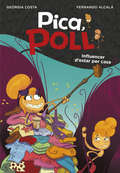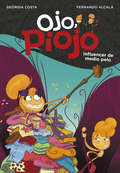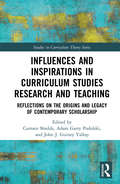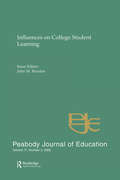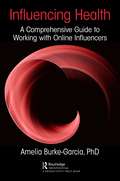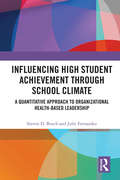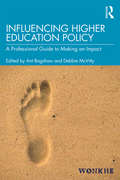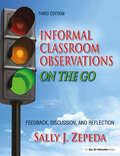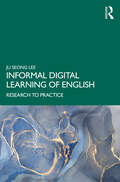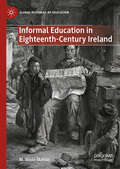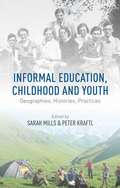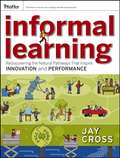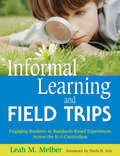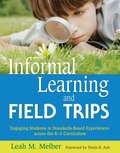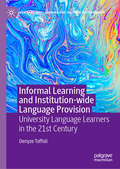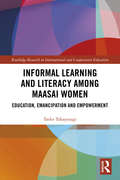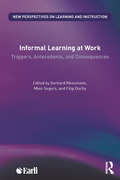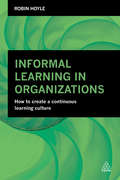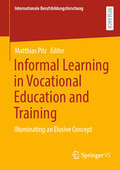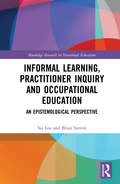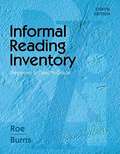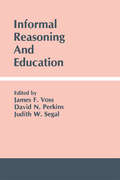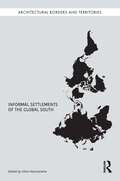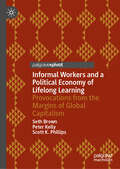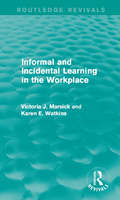- Table View
- List View
Influencer d'estar per casa (Pica, Poll #Volumen 3)
by Georgia Costa Fernando AlcaláPICA, POLL! Una escola, uns nens, i aquestes petites bestioles apoderant-se dels seus caps! Una sèrie de primeres lectures DIVERTIDÍSSIMA. La Picorina ja no vol ser exploradora de cuirs cabelluts, vol ser... una poll influencer i obrir-se un canal a Youtube! Ho té tan clar que s'ha escapat de casa perquè algú li ensenyi a ser youtuber, i ara el Pessigoi no la troba per enlloc. Haurà de buscar-la sense parar abans que es fiqui en algun embolic...
Influencer de medio pelo (Ojo, Piojo #Volumen 3)
by Georgia Costa Fernando Alcalá¡OJO, PIOJO! Un colegio, unos niños,¡y esos bichitos tomando el control de sus cabezas! Una serie de primeras lecturas DESTERNILLANTE. Picorina ya no quiere ser exploradora de cueros cabelludos, quiere ser... ¡una pioja influencer y abrirse un canal de Youtube! Lo tiene tan claro que se ha escapado de casa para que alguien le enseñe a ser youtuber, y ahora Cosquillo no la encuentra por ningún lado. Va a tener que buscarla sin parar antes de que se meta en el algún lío...
Influences and Inspirations in Curriculum Studies Research and Teaching: Reflections on the Origins and Legacy of Contemporary Scholarship (Studies in Curriculum Theory Series)
by Carmen Shields Adam Garry Podolski John J. Guiney YallopThis volume highlights lived experiences, personal inspirations and motivations, which have generated scholarship, and influenced the research and teaching of scholars in the field of curriculum studies. Offering contributions from new, established and experienced scholars, chapters foreground the ways in which the authors have been influenced by the mentorship and work of others, by personal challenges, and by the contexts in which they live and work. Chapters also illustrate how scholars have engaged in variety of methodological and autobiographical processes including narrative and poetic inquiry, autoethnography and visual arts research. Through a range of contributions, the book clarifies the origins and legacy of contemporary curriculum studies and in doing so, provides inspiration for beginning scholars and academics as they continue to find their voices in academic communities. Offering rich insight into the experiences and scholarship of a wide range of scholars, this volume will be of interest to students, scholars and researchers with an interest in curriculum studies, as well as educational research and methodologies more broadly.
Influences on College Student Learning: Special Issue of peabody Journal of Education
by John M. BraxtonFirst Published in 2003. Routledge is an imprint of Taylor & Francis, an informa company.
Influencing Health: A Comprehensive Guide to Working with Online Influencers
by Amelia Burke-GarciaThe U.S., and countries around the globe, are facing an ever-evolving series of health issues, including obesity, food deserts, child hunger, poor maternal health outcomes, and the resurgence of communicable diseases. Traditionally, health communicators and marketers have talked about these issues in a vacuum, in which related information is only visible when people are specifically seeking it out. If we are to give global health the attention it deserves, we need to weave it into our everyday conversations and experiences. Ultimately, we need to normalize the conversation around health. The emergence of everyday online opinion leaders has created a whole new market for shifting consumer perceptions and behaviors. In fact, many of these everyday online opinion leaders, called influencers, have built such large-scale social media presences that they now have the voice, the platform, and the following to reach millions of people with personal points of view on any number of topics. There are great opportunities for engaging with online influencers to support health promotion programs. However, navigating this online community is new to many people. Understanding how this online community works, the opportunities for paid and unpaid engagements, and the value that health programs specifically have with this community, is paramount to successfully working with influencers. This book draws from research with over 400 online influencers, the latest industry data, and practical, real-world experiences working with influencers over the past ten years. An easy-to-read guidebook for marketers and health communicators alike, this book leverages storytelling as a means for sharing lessons-learned and providing readers with practical knowledge about the online marketing industry and influencer community, as they relate to health.
Influencing High Student Achievement through School Culture and Climate: A Quantitative Approach to Organizational Health-Based Leadership
by Steven Busch Julie FernandezThis book demonstrates how the school principal’s consideration of culture and climate of the school can significantly improve and sustain student achievement over time. Highlighting an innovative approach to organizational health and student achievement, this volume uses inferential statistical data analysis to quantify the way school leaders can strategically interact within school culture and systems to improve student achievement. A cutting-edge analysis of the importance of school climate, this book draws on current research from the Organizational Health Inventory diagnostic framework to provide data-based conceptual models of the relation between culture and leadership.
Influencing Higher Education Policy: A Professional Guide to Making an Impact
by Ant Bagshaw Debbie McVittyDrawing together a team of expert contributors from across the sector to offer contemporary descriptions and critical reflection of practice in higher education, Influencing Higher Education Policy uncovers the nature of policymaking and interpretation. With a suite of authors whose experiences range from governmental to academic, this book shares insights from professionals working in the field of higher education policy to provide useful, practical, and implementable information. Placing focus on professional aspects, and with practical examples bringing to light experiences, insights, and recommendations across policy and public affairs, this book is divided into three sections. It covers concepts and theories for policy influence, regulation and the role of government, and institutions’ engagement with policy. Furthermore, it considers: what it means to work in policy and public affairs in higher education; the increased complexity and fluidity of higher education politics; regulatory reforms in higher education; the position of the student in policy discourses. Offering a contemporary representation, Influencing Higher Education Policy is an indispensable guide for all those who work in higher education, particularly those who work in communications, strategy, planning, and leadership roles.
Informal Classroom Observations On the Go: Feedback, Discussion and Reflection
by Sally J. ZepedaIn the third edition of this bestselling book, instructional leadership expert Sally Zepeda shares eleven more field-tested, informal classroom observation tools designed specifically for school personnel working with teachers to assist them in developing their instructional strategies. The book includes the most comprehensive set of tools available today for classroom walkthroughs, professional development, and effective feedback. It is an invaluable resource for instructional coaches, curriculum coordinators, department chairs, and school leaders. The revised third edition includes: 51 tools usable in print, on laptop computers, or on electronic tablets Strategies for conducting post-observation conferences Indexes to browse and choose the tools that best fit your individual needs
Informal Digital Learning of English: Research to Practice
by Ju Seong LeeIn today’s digital era, increasing numbers of youth around the world learn English outside classrooms, frequently with the use of technology. This timely book brings together research and theory on the increasingly common phenomenon of Informal Digital Learning of English (IDLE) among students of all ages and across a wide range of contexts globally. By examining the positive impact of IDLE on students’ reading, writing, listening, and speaking abilities, as well as the unique challenges that result, Lee synthesizes research in one accessible and comprehensive volume in this rapidly developing domain. This book addresses key concepts, including Computer Assisted Language Learning, the impact on standardized assessment, and the role of classroom learning. Lee offers empirically tested activities, pedagogical recommendations, and lesson plans to engage ESL/EFL students. The research overview and practical offerings make this an ideal text for courses in TESOL on online education, language teaching online, digital learning, community and language, and applied linguistics.
Informal Education in Eighteenth-Century Ireland (Global Histories of Education)
by M. Wade MahonThis book documents an informal system of education that emerged in Ireland between the late 1750s and the end of the century, a system that operated largely without funding or direction by church or state. In a society as divided as eighteenth-century Ireland, it is remarkable that such a system could succeed, paving the way for the more formal reforms of Irish education that followed in the nineteenth century. Based on detailed evidence from newspaper advertisements, directories, educational prospectuses, textbooks, and other print documents from the period as well as previously unexamined manuscript resources, the author describes this system and how it functioned, emphasizing the transnational dimensions of print culture, English literature, and education reform.
Informal Education, Childhood and Youth
by Sarah Mills Peter KraftlThis collection of original chapters brings together cutting-edge research on informal education - that is, learning practices that emphasise dialogue and learning through everyday life. For the first time, it highlights the way in which geography matters to informal education practices. Through a range of examples from the nineteenth, twentieth and twenty-first centuries, and from a range of geographical contexts, the authors explore the relationship between history, geography and practice in the field of informal education. Case studies include youth work, Scouting, Guiding, Care Farms, youth music programmes and the use of online/information technologies. This book will be of interest to geographers and sociologists of education, childhood and youth scholars. It also provides an engaging resource and collection of case studies for educators, youth workers and other professionals who work with young people.
Informal Learning
by Jay CrossMost learning on the job is informal. This book offers advice on how to support, nurture, and leverage informal learning and helps trainers to go beyond their typical classes and programs in order to widen and deepen heir reach. The author reminds us that we live in a new, radically different, constantly changing, and often distracting workplace. He guides us through the plethora of digital learning tools that workers are now accessing through their computers, PDAs, and cell phones.
Informal Learning and Field Trips: Engaging Students in Standards-Based Experiences Across the K-5 Curriculum
by Leah M. MelberThe author shows teachers how to incorporate constructivist philosophy and inquiry-based learning techniques for standards-aligned, off-site learning experiences and provides guidelines for developing corresponding classroom activities.
Informal Learning and Field Trips: Engaging Students in Standards-Based Experiences across the K?5 Curriculum
by Leah M. Melber Doris B AshTurn every field trip into a high-quality learning experience!What youngster isn't excited at the prospect of taking a field trip? Enthusiastic students present teachers with the ideal scenario for creating meaningful out-of-the-classroom encounters and giving students the building blocks to help them become active participants in their own educational process.This resource helps educators take full advantage of off-site educational opportunities by developing lessons that connect informal learning with content standards. Based on constructivist philosophy and inquiry-based learning, the book provides numerous sample lesson plans and technology tips, and includes: Learner-centered activities for language arts, math, science, social studies, and fine art Ways to support English Language Learners and special education students Guidelines for developing corresponding classroom activities Strategies for building partnerships with informal learning sites Methods for bringing museum-type activities into the classroom when a trip is not possibleField trips turn the whole world into a classroom. Informal Learning and Field Trips helps enrich students' lives as they explore the world outside the school grounds and gives teachers a prime opportunity to revitalize the learning experience.
Informal Learning and Institution-wide Language Provision: University Language Learners in the 21st Century (New Language Learning and Teaching Environments)
by Denyze Toffoli“Theoretically wise and practically powerful, this book is about how to take full advantage of advances in technology and the learner autonomy they afford, rather than simply adapt to or deny them. It issues a clarion call to language educators and administrators interested in building on recent advances in language learning via the informal avenues of digital communications.” --Mark Dressman, Professor Emeritus, University of Illinois at Urbana-Champaign, US, Professor and Chair of English at Khalifa University, UAE “This important and original book challenges us to rethink the design and delivery of the language learning opportunities universities provide for their students. Drawing on Complex Dynamic Systems Theory, Self-Determination Theory and her own empirical explorations of informal online language learning, Denyze Toffoli paints a portrait of today’s university language learner that is novel, unexpected and urgent.” --David Little, Fellow and Associate Professor Emeritus at Trinity College, IrelandThis book takes a fresh look at both context and the language learner in an attempt to shed light on the holistic and ever-changing system of the contemporary L2 speaker’s language development. Drawing on complex dynamic systems theory as a means to more fully understand the holistic nature of contemporary language learning, the author attempts to bridge the longstanding gap between formal language provision in Higher Education institutions, and more informal language acquisition achieved through activities such as listening to music, watching films and television, and playing games. Based on a theoretical understanding of the interplay between these contexts, contents and practices, the author offers suggestions concerning the shape of language centres in higher education and the role of teachers in readying the contemporary language learner for autonomous lifelong and lifewide language development. This book will be of particular interest to language teachers, teacher trainers, and higher education administrators.
Informal Learning and Literacy among Maasai Women: Education, Emancipation and Empowerment (Routledge Research in International and Comparative Education)
by Taeko TakayanagiInformal Learning and Literacy among Maasai Women highlights the importance and role of informal education in the emancipation and development of Maasai village women in Kenya. At present, knowledge and research on the impact of informal learning and literacy on community development is limited, and there is a gap between policy level discussions and women’s lived experiences. Using a postcolonial feminist framework, this book sets out to examine linkages between informal learning and literacy, human development and gender inequality. Despite improvements in recent years, access to traditional education remains restricted for many women in rural communities across Kenya. Takayangi’s book is the first to introduce how Maasai village women utilise informal learning and literacy for collective empowerment as well as to sustain their own well-being and that of their families. It presents the perspectives of both local women and institutions and argues that women’s learning is most effective when located within their own socio-cultural and political discourses, and when their voices are listened to and heard. This ethnographic research study is a valuable resource that will contribute to the knowledge of literacy from both theoretical and practical perspectives. It is an essential read for those studying or researching information education, development studies and gender, or education, as well as for teachers, community leaders and aid workers.
Informal Learning at Work: Triggers, Antecedents, and Consequences (New Perspectives on Learning and Instruction)
by Filip Dochy Mien Segers Gerhard MessmannInformal Learning at Work reflects the growing interest in changing the way the workplace encourages and enhances learning and professional development. Due to societal, economic, and technological developments, organisations face the pressure of growing knowledge-intensity and the need for innovations. As a result, employees are expected to adapt to new situations and constantly update their skillsets within an increasingly challenging environment. This book brings together cross-disciplinary perspectives from leading international researchers, drawing on a range of theoretical and empirical studies. <P><P>Extensively researched and expertly edited, this new addition to the EARLI New Perspectives on Learning and Instruction series outlines the starting points for future research, and highlights the benefits and implications for those aiming to foster informal learning at work, covering areas such as: <li>professional judgement <li>improving the structure of work tasks <li>facilitating innovative work behaviour <li>the place of informal learning within teaching <P><P>Informal Learning at Work presents original quantitative and qualitative studies as well as integrative analyses of worldwide research and is an invaluable introduction to this highly topical subject.
Informal Learning in Organizations
by Robin HoyleAs the pace of change in the workplace accelerates and training budgets are challenged, it becomes essential for employees to learn as they go along. In this connected world, new ways of learning are emerging all of the time, whether the learning is planned, unexpected or self-directed. For those responsible for learning and development in organizations, understanding how this kind of informal learning can be utilised and measured is key to providing efficient and cost-effective ways of delivering on organizational objectives around people development. Informal Learning in Organizations offers practical tools, including checklists and action plan questions, to guide the Learning and Development practitioner in how to design and implement an informal learning strategy that is personalised to the needs of their own organization. It combines the latest thinking on new technology and practices with established theory and research to provide an evidence-based review of informal learning and its true impact. It offers an overview of how and why informal learning resonates with people, how it works and when and why it doesn't. This book will assist the reader in making sense of their connected environments to create a continuous learning culture in their organizations.
Informal Learning in Vocational Education and Training: Illuminating an Elusive Concept (Internationale Berufsbildungsforschung)
by Matthias PilzEntering educational debate more than 50 years back, the notion of informal learning is still highly relevant today and of specific interest in the context of vocational education and training (VET). Still, we do not know a lot about a wide range of aspects of the topic as well as interactions between formal and informal learning. Defining the latter precisely presents difficulties to the world of research, as the concept itself is characterised by flexibility and openness. This book was initiated to fill a gap in understanding informal learning in the context of training and development. 18 chapters cover a wide range of aspects and different objectives, levels and places of informal learning. Authors from different parts of Europe as well as Japan, Australia, India and Bangladesh have been selected to contribute to the topic from varying country perspectives. As such, this volume makes a unique contribution in exploring informal learning in VET.
Informal Learning, Practitioner Inquiry and Occupational Education: An Epistemological Perspective (Routledge Research in Vocational Education)
by Brian Sutton Sai LooInformal Learning, Practitioner Inquiry and Occupational Education explores how practitioners in a variety of occupations perform their jobs and argues that working and learning are intricately connected. Drawing on theories around working and learning in informal, formal and lifelong settings, the book gives insights into how workers negotiate their occupational practices. The book investigates four related concepts – informal learning, practitioner inquiry, occupational education and epistemological perspectives. The combinations of theories and empirical case studies are used to provide a conceptual framework of inquiry where knowledge, abilities, experiences and skill sets play a significant aspect. It presents 11 case studies of professions ranging from conventional occupations of acting, detective work, international road transportation to emerging professions of boardroom consultancy, nutritional therapy and opinion leadership. This book will be of great interest for academics, scholars and postgraduate students who are engaged in the study of informal education, vocational education and occupation-related programmes. It will also offer significant insights for related education practitioners wanting to have greater understanding of their own journeys and practices.
Informal Reading Inventory: Pre-primer to Twelfth Grade (Eighth Edition)
by Betty D. Roe Paul C. Burns'Informal Reading Inventory'- is designed for use by several different groups like pre-service college students learning informal reading inventories and as a practical guide for special reading teachers as an easily administered assessment instrument for assessing their students' reading progress.
Informal Reasoning and Education
by James F. Voss David N. Perkins Judith W. SegalBased on extensive reasoning acquisition research, this volume provides theoretical and empirical considerations of the reasoning that occurs during the course of everyday personal and professional activities. Of particular interest is the text's focus on the question of how such reasoning takes place during school activities and how students acquire reasoning skills.
Informal Settlements of the Global South (Architectural Borders and Territories)
by Gihan KarunaratneBringing together case studies ranging across the globe, including theUS-Mexico borderlands, the Calais encampment in France, refugee camps in Kenya, Uganda and Bangladesh and contested ‘informal’ enclaves and communities in the cities of India, China, Brazil, Nigeria and South Africa, this book challenges current ways of thinking about the governance of human settling, mobility and placemaking. Together, the 15 essays question the validity of the conventional hegemonic divisions of Global North vs. Global South and ‘formal’ vs. ‘informal’, in terms of geographic presence, transborder performances and the ideological inter-dependence of Northern and Southern spaces, spatial practices and the uniformity of authoritative enforcements. The book, whose authors themselves come from all over the world, uses ‘Global South’ as a methodological apparatus to ask the ‘Southern’ question of settling and unsettling across the globe. Crucially, the studies reveal the sentiments, resourcefulness and the agency of those positioned by the powerful within the dichotomies of formal/informal, legitimate/ illegal, privileged/marginalized, etc., who are traditionally identified within the dominant development discourse as mere numbers or designated by intervening institutions as helpless recipients. By focussing on hitherto invisible events and untold stories of adaptation, negotiation and contestation by people and their communities, this volume of essays takes the ongoing North-South debate in new directions and opens up to the reader’s fresh areas of enquiry. It will be of interest to researchers and students of architecture, planning, politics and sociology, as well as built environment professionals.
Informal Workers and a Political Economy of Lifelong Learning: Provocations from the Margins of Global Capitalism
by Peter Kelly Seth Brown Scott K. PhillipsThis book makes an innovative, sociologically informed contribution to academic and policy discussions about informal work, skills and training for lifelong learning (LLL) and the promise of decent work and just transitions for sustainable development. It does so with an explicit focus on challenges and opportunities as they shape informal economies and the experiences of informal workers in Latin America and the Caribbean, the Middle East and North Africa, Sub-Saharan Africa, Central and Eastern Europe, and the Asia Pacific. The authors highlight historical and contemporary characteristics of informality in different regions from a political economy of LLL perspective. This political economy approach draws on theories of post- and neo- colonialism, space, place and globalisation, critical accounts of curriculum and pedagogy in skills and vocational education and training. The book will appeal to students and scholars of education, particularly adult education and LLL and technical and vocational education and training, as well as sociology, labour economics, and international and sustainable development.
Informal and Incidental Learning in the Workplace (Routledge Revivals)
by Victoria J. Marsick Karen WatkinsToday, rapid change is a constant challenge in the workplace, and thousands of individuals need to be involved in continuous learning. Traditional training approaches, however, do not emphasise informal and incidental learning. Furthermore, since informal learning us seldom designed, learning outside of a structured experience may lead to mistaken or dysfunctional learning. Strategies for improving informal learning are urgently needed. This book, first published in 1990, responds to this need by taking a challenging look at many assumptions about workplace learning outside of the classroom and by proposing methods to improve it. They develop a theory of informal and incidental workplace learning based on current developments in training and human resource development which they illustrate with readable and illuminating case studies which tell vivid stories of adult education and human resource development practice. Informal and Incidental Learning in the Workplace is essential reading for researchers and practitioners of human resource development, and also for students of education and adult learning.
